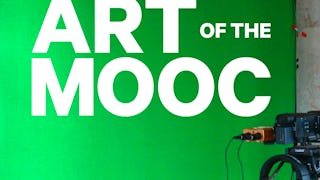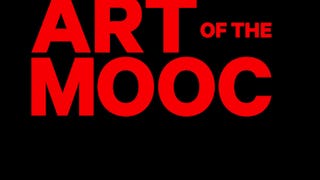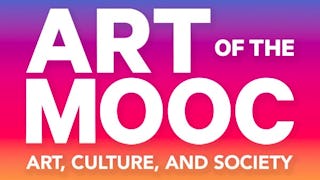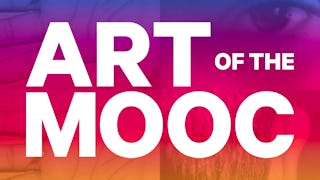Students of this course may try their hand at their own sound interventions and musical compositions, or simply focus on learning more about diverse musical traditions, sonic experimentation, and acoustic phenomena in everyday life. Designed by artist and Duke professor, Pedro Lasch, and UdK composer Mathias Hinke, this course is also co-taught by scholar and musician Jace Clayton (DJ Rupture) and curator Candice Hopkins (Documenta 14). The lectures link major artistic developments of recent decades to wider ideas about sound in specific social and spatial contexts.




Art of the MOOC: Experiments with Sound
This course is part of Art of the MOOC: Art, Culture, and Society Specialization



Instructors: Pedro Lasch
8,594 already enrolled
Included with
(77 reviews)
Skills you'll gain
Details to know

Add to your LinkedIn profile
8 assignments
See how employees at top companies are mastering in-demand skills

Build your subject-matter expertise
- Learn new concepts from industry experts
- Gain a foundational understanding of a subject or tool
- Develop job-relevant skills with hands-on projects
- Earn a shareable career certificate

There are 8 modules in this course
This module introduces the four co-teachers of the course (Lasch, Clayton, Hinke, Hopkins), along with five analytical concepts that we will use throughout its sections and projects: Frequency, Perspective, Material Frame, Time Frame, and Concurrency. These concepts are designed to encompass a wide range of acoustic phenomena within spatial and social experience.
What's included
2 videos3 readings1 assignment
This lesson expands on specific terms or ‘sound elements’ that include tuning, resonance, silence, improvisation, rhythm, synchronization, duration, and timbre. It also addresses traditional tools in sound production, from musical instruments to sampling, auto-tunes, and other more recent technologies. The module concludes by exploring the role of sound in specific non-musical social settings and practices, such as clapping, fan culture, sports, traffic jams, mass demonstrations, and more.
What's included
10 videos1 assignment
The practical component of this section is optional, asking learners to choose a space with specific ‘sound rules’ and change or alter these rules through actual experimentation.
What's included
1 video1 reading1 assignment
This lesson begins by focusing on the relationship between experimental practices and scores or notation systems. It also examines how sound has been used and understood by artists in specific urban contexts, such as ports, train stations, and airports, as well as rural settings, including forests, gardens, and the wider landscape. We conclude with an examination of how sound and music travel, be it through the populations who produce it, or the objects and digital files that are used to record and share it.
What's included
8 videos1 assignment
The practical component is optional, inviting learners to ‘erase a sound in space’ through a range of possible strategies.
What's included
1 video1 reading1 assignment
This lesson provides an overview of the methods and ideas from different schools of listening. It also presents a critical examination of the term ‘world music’ and how it has evolved in relation to economic and cultural globalization. With this global perspective in mind, the concluding portions of our lectures are dedicated to acoustic experience and musical experimentation on the net, the radio, cellular networks, and various social media, including all of the glitches, accidents, and failures we associate with these platforms.
What's included
8 videos1 assignment
The practical component of this module is optional, asking learners to produce their own experiment with media and technical failure.
What's included
1 video1 reading1 assignment
This module is optional and only for those who wish to put what they learned from the course into one final project that is more open and ambitious in scale. Two options are given for this, one being your most ambitious project, and the other based on the creation and use of your own musical instruments.
What's included
1 video2 readings1 assignment
Earn a career certificate
Add this credential to your LinkedIn profile, resume, or CV. Share it on social media and in your performance review.
Instructors



Explore more from History
 Status: Free Trial
Status: Free TrialDuke University
 Status: Free Trial
Status: Free TrialDuke University
 Status: Free Trial
Status: Free TrialDuke University
 Status: Free Trial
Status: Free TrialDuke University
Why people choose Coursera for their career




Learner reviews
77 reviews
- 5 stars
83.11%
- 4 stars
12.98%
- 3 stars
2.59%
- 2 stars
1.29%
- 1 star
0%
Showing 3 of 77
Reviewed on Aug 26, 2019
This has been the best course so far that I have came across online.
Reviewed on Apr 2, 2024
It is a very well curated program, the lectures are very intriguing.
Reviewed on May 30, 2020
Amazing course with ample examples and very well organised guest presentations.

Open new doors with Coursera Plus
Unlimited access to 10,000+ world-class courses, hands-on projects, and job-ready certificate programs - all included in your subscription
Advance your career with an online degree
Earn a degree from world-class universities - 100% online
Join over 3,400 global companies that choose Coursera for Business
Upskill your employees to excel in the digital economy
Frequently asked questions
You can access all videos, readings, and discussions, free of charge. You can also submit assignments and earn a grade for free. If you want to earn a Course Certificate, you can purchase the course for $49 or apply for Financial Aid.
No. Completion of a Coursera course does not earn you academic credit from Duke; therefore, Duke is not able to provide you with a university transcript. However, your electronic Certificate will be added to your Accomplishments page - from there, you can print your Certificate or add it to your LinkedIn profile.
To access the course materials, assignments and to earn a Certificate, you will need to purchase the Certificate experience when you enroll in a course. You can try a Free Trial instead, or apply for Financial Aid. The course may offer 'Full Course, No Certificate' instead. This option lets you see all course materials, submit required assessments, and get a final grade. This also means that you will not be able to purchase a Certificate experience.
More questions
Financial aid available,




